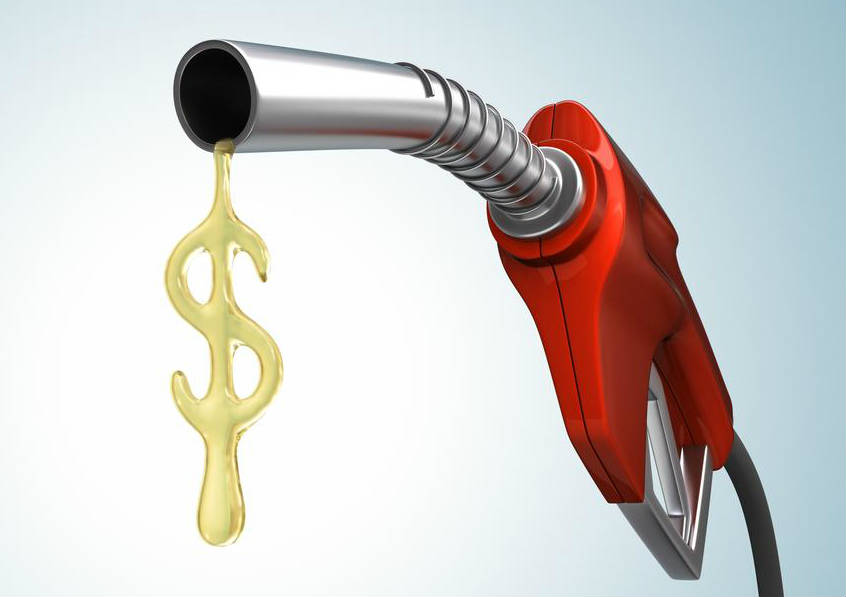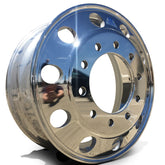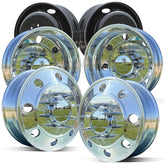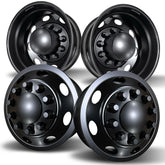Aluminum Wheels or Steel Wheels for My Truck?
Your truck deserves the best.
So which is it, aluminum or steel?
What is it about aluminum wheels that have made them the industry standard for so many trucks?
Peterbilt, Freightliner, Mack, Ford, Chevy/GMC, Dodge Ram -- they’re all coming off the lot with aluminum wheels as their choice.
But why?
This article aims at breaking down the science that’ll retire this age-old question.
It's been a hard fought battle between aluminum and steel, but ultimately aluminum dominates.
Aluminum (also called alloy):
Puts Less Stress on Your Truck
The number one benefit to switching over to alloy wheels on your big rig is the weight savings. Aluminum is one third the weight of steel and is stronger than you’ll ever need it to be. That’s why we confidently say fully forged aluminum is pound for pound the strongest material on the market when it comes to wheels.
There’s plenty of benefits to the weight savings, but one we’d like to highlight is how much less stress your truck’s components endure. If you’re looking to join the 2 million mile club, making the switch to aluminum is a smart move.
Think about it like riding a bicycle. If you have a heavy bike, you’re going to feel it in your legs. You’ll notice the weight every time you start pedalling. Every hill you climb your heart strains that much more. The stops you make aren’t quite as quick as the last. You’ll feel the difference in every single muscle you use.
This is just like your truck's components. With more weight your engine has to exhaust itself to get going. Every hill you climb puts more strain on your transmission and gears. Your brakes, your suspensions, and even your drivetrain will quickly grind down as you decelerate.
Aluminum may cost a little more up front, but it’s worth its weight in gold when considering the life of your truck and tires.
Saves More on Fuel
Fuel savings go hand in hand with the weight savings of your vehicle. The Rocky Mountain Institute and NRCAN solidly back this up with science by saying, ”The heavier the vehicle is, the more energy it needs to get moving. Heavier vehicles have greater inertia and greater rolling resistance, which both contribute to increased fuel consumption. Reducing weight is a very effective way to improve a vehicle’s efficiency.”
Furthermore, MIT (Massachusetts Institute of Technology) says something similar. If over the next 15 years we reduce the weight of vehicles by 35%, “Vehicle weight reductions of this magnitude could alone result in some 12–20% reduction in vehicle fuel consumption.”

This is not to say that lighter wheels will be the difference maker in getting you over the 10mpg milestone, but it will improve your chances.
When it comes to professional driving, there are so many other factors that affect fuel economy. Many of which depend on the driver, how heavy their foot is, how quickly they switch gears, and how often they stop to pay the water bill are all things to consider.
Allows You to Haul More Weight
With this forged alloy, you’ll be able to haul more without exceeding the weight limit of your Full Truckload (FTL). This’ll put more money in your pocket if you’re paid every hundred pounds.
The average 22.5” steel wheel we sell weighs 75 lbs, while the average aluminum 22.5” wheel we sell weighs 45 lbs. That’s a difference of 30lbs per wheel. Now if your rig runs on 18 wheels that’s going to be 30 lbs X 18 wheels = That’s 540 lbs! Think of how much more you’d get paid every time you haul.
We also sell the lightest 22.5” wheel on the market -- Alcoa’s Ultra ONE (39 lbs).
Has More Impact Resistance
It’s been proven through various industry standard tests that aluminum wheels can take more of an impact than steel wheels can.
AWM (Aluminum Wheels MFG Inc.) notes, “A standard impact resistance capability test was performed by Forging Technology Center, the result proves that upon identical impact, the damage to a forged alloy wheel is much less than that of a steel hub.”
The point at which a steel wheel starts to deform is much lower and likely to happen on the road than the point of deformity for an aluminum wheel.
When they get to these limits the two metals react very differently.
Given a hard enough hit, steel wheels bend on impact due to their high ductility. This high ductility wil allow you to be able to pound out and get the steel wheel somewhat back to round. Unfortunately, you won’t be able to get it perfectly balanced.
Alloy wheels take more of an impact, but eventually crack when hitting their point of deformity.
Alcoa, the world leader in alloy truck wheels. Released this YouTube video (to the right) that shows a standard impact test between their fully forged aluminum wheel, a steel wheel, and a liquid cast aluminum wheel from Asia. Maximize the size of the video to see the full results.
The video clearly shows that fully forged aluminum wheels are much better than both steel and liquid cast aluminum. For more information on the differences check out our article: Fully Forged or Liquid Casted Aluminum Wheels?
Improves Tire Balance, Heat Dissipation, Braking, and Tread Wear
Steel wheels are built by hand and are too difficult to make in a single part.
Manufactures of steel wheels undergo a process that includes heating steel billets, pressing them into two molds, taking the red-hot molds out of the furnace, turning them around onto themselves, hand welding them together, hand welding a front plate disc to each wheel, and letting them cool off.
Steel wheels are not welded together with machine precision. For this reason, they aren’t perfectly balanced and have coined the term “out of round”.
Aluminum wheels are known to be made true and perfectly balanced by machines.
An unbalanced wheel can lead to many issues, but a few we’d like to highlight are the damage it could cause to your suspension, the tread on your tires, and your brakes. We’d also like to mention the brutal effects that heat can cause to your truck, and how aluminum wheels help minimize these effects.
1. Damage to Suspension
The collective minds of MIT state, “a wheel out of balance, imparts unintended vibration on suspension components and may manifest as a ”shimmy” or ”shake” on the steering wheel, rattle a vehicle and its contents, or cause loads to be applied on vehicle components in unanticipated ways… Additionally, wheel vibration can cause uneven tire tread wear.. bent tire rod.. can even lead to slow leaks and air loss, which at best reduce fuel economy and vehicle performance, and at worst, lead to a blowout with potentially dire consequences.”
Key Take Away: MIT tells us that unbalanced tires lead to multiple problems including damage to suspension and uneven tire tread wear.
2. Damage to Tire Tread
AWM tells us that an unbalanced wheel and the natural quality of aluminum’s heat dissipation can help your tire obtain “reduced tire wear by 26% -- Due to the nature of forged aluminum alloy wheels, it is perfectly balanced upon [being] built and does not deform easily. Heat is quickly dispelled from the wheel (average normal operating temperature is 20-30 C degrees lower than steel wheels). Lower temperature also better protects [your] suspension system. Better suspension system reduces wear and tear on tires, which extends usable life of a tire up to 50,000 to 80,000 kilometers.”
Key Take Away: The heat dissipation qualities of aluminum can extend your truck’s tire life by up to 31,068 to 49,709 miles.
3. Damage to Brakes
AWM continues to say, “The forged wheels dispel heat quickly and keep wheel temperatures low, maintaining optimal operating temperatures for the braking system. This leads to the extended lifespan of brake parts and reduces the overall maintenance cost of the brake system… For a vehicle traveling at a high speed, intense heat from tire friction and braking system can cause tire explosion or malfunction of braking system. The thermal conductivity of aluminum alloy is three times that of steel or iron. Aluminum alloy wheels unique structural feature makes it easy to dispel heat generated by tire and vehicle chassis. Even in the case of high-speed driving for long duration or continuous downhill braking, aluminum alloy wheel can help the vehicle to maintain proper temperature. The tire and braking drum are able to operate at a temperature much lower than that of a steel hub, avoiding negative impact caused by high temperature.”
Key Take Away: The heat dissipation qualities of aluminum are 3 times better than steel and help your brakes to cool down quickly so you can get home safely.
Is More Resistant to Corrosion
Alloy wheels are completely rust resistant. Aluminum doesn’t contain iron or carbon like steel does, so it doesn’t rust.
Stainless steel doesn’t rust either, but manufacturers don't make wheels from stainless steel -- they'd just be too heavy.
Chrome wheels also have a rust resistant exterior, but a stray rock or stick can change that. Any road hazard can ding the wheel and expose the steel under it. This unmasked steel rusts very quickly.
The reason why aluminum is so corrosion resistant is because exposed alloy naturally develops its own fortress against corrosion. Aluminum develops a micro-layer of oxide that’s so thin (0.0002 cm thick) that if it was ever necessary you could easily polish it out.
Research from Stanford discovered that what makes aluminum so special is that when water touches aluminum oxide its structure simply changes. “This change in molecular structure is why aluminum oxide metal resists corrosion.”
Basically, aluminum doesn’t rust and keeps its shine.
Shines Longer Than Chrome
Your truck says a lot about you. It defines who you are and can turn heads on the big road. Your truck is your image. Polished wheels can go a long way to building that image up.
There are a lot of choices out there when it comes to choosing the right polish. We tailor made another article for you: What’s the Difference Between Standard Polish, High Polish & Mirror Polish?
In this article though, we’ll stick to talking about the 3 main reasons why polished aluminum is better than chrome plated wheels for your big rig.
1. More Authentic Shine.
William Zane of Itstillruns.com says, “polished alloy wheels have a beautiful finish that is more rich in its appearance than chrome thanks to the hand-polished look.”
If you’re using a chrome or stainless steel simulator over your steel wheels, you’ve likely already had one fall off, dent, or start rattling. These common problems are hard to avoid.
2. Easier to Restore
Zane also says that, “Another benefit of polished wheels is that when the finish becomes dulled and tarnished, they can simply be re-polished.”
Polishing your wheels doesn’t take a lot of effort and there are plenty of products on the market. But, if maintaining your shine sounds like too much work, you can always look into Alcoa’s Dura-BrightⓇ EVO.
There are plenty of professional drivers out there that save time and money by purchasing Alcoa’s Dura-BrightⓇ option for their rig.
On average, having your wheels rep-polished can cost $45 per wheel. With Dura-BrightⓇ, you can skip the shine session and just hit them with a water hose, some soap, and a light scrub every now and then. On the left is a video of just how easy it is to restore Alcoa's Dura-BrightⓇ wheels
3. More Bang for Your Buck
When comparing apples to apples. Polished aluminum wheels are only a little more expensive than their chrome plated counterparts.
If you’re looking to go with a chrome or stainless steel simulator, you might as well pay the extra bit and get all the other benefits too.
Is Environmentally Safer
Steel and aluminum are both metals that are 100% recyclable. In fact, so are most metals. Most metals end up being recycled over and over again in an infinite loop. Which is fantastic for the environment considering the amount of effort and resources it takes to get virgin metals out of their respective ores. It’s also great for the economy because hundreds of millions of dollars are saved by recycling renewable materials.
Aluminum.org put out a fact that might be surprising to hear, “More than 90 percent of the aluminum in building and automotive parts is recycled at the end of use.” That’s pretty impressive given the sheer amount of volume that we’re talking about.
When it comes to sustainability, the biggest difference between steel and aluminum is that aluminum weighs less than steel to transport. This gives aluminum the added benefit of saving the economy and environment of fuel consumption and the release of harmful carbon emissions.
Bottom Line
The age-old question of Aluminum Wheels or Steel Wheels for My Truck? can now retire in peace.
Science has made a compelling argument that aluminum is hands down the better choice due to the facts that aluminum:



